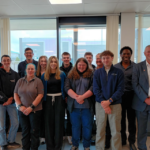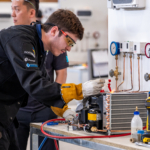Being authentic in life and work is challenging for everyone, but it is also incredibly important, particularly for those of us who identify as LGBT. Being yourself at work, stopping policing your pronouns and being able to talk about your personal life as much as your colleagues, brings real benefits to workplace performance at any level of an organisation.
Research from Stonewall, however shows there is still a real need to make progress on this front. In its report ‘Shut Out’ released this week, the experiences of LGBT young people not in education, training or work are explored. Worryingly the report found that in work and apprenticeships, experienced and expected discrimination compound wider barriers to prevent many LGBT young people from starting, and staying, in employment. Of those who took part in the research, some said they felt forced to leave employment because of negative workplace experiences, including anti-LGBT bullying and harassment. Most of the young people Stonewall spoke with also said they weren’t aware of how to access suitable apprenticeships. Those who had found an apprenticeship said they faced LGBT-specific challenges during their time or struggled to find suitable work after completing their apprenticeship. The ability to simply be out at work is something that young people today expect from day one on starting a new job, and it is something that we should all be working hard to achieve.
I believe changing perceptions and practice starts with leadership. My own experience of coming out at work to my team, my board and our stakeholders has made me determined to help others. It was a daunting experience but once I had done it, the benefits were clear: better and more trusting relationships with colleagues and clients turned into further professional success. And I believe that leading by example and role modelling is vital to drive change.
This time last year we brought together senior LGBT leaders and allies from across education, business and government to consider the challenges and opportunities faced by young people who identify as LGBT+ in the FE sector. The report from this event made recommendations to help support organisations create an inclusive working environment for staff and young people.
The insight from the report is still relevant today. It prompted me to asses our own inclusive working practises at WorldSkills UK. I realised that despite a number of initiatives aimed at increasing the diversity of those who engaged with and participated in our skills competitions, we were still failing to live up to our ambitions to be as inclusive as possible in our work. To better understand the challenges faced by young people in education and training, we commissioned research from The Social Partnership Innovation Project (TSIP). As we are undertaking this research, it has become clear that more leaders in the FE sector must come together to reach out to parents, teachers and young people to change the stereotypes that exist and ensure young people have access to all the information they need to make informed career decisions.
We also can’t afford to ignore the impact of role modelling in helping to change stereotypes. Research from visitors to WorldSkills UK LIVE in 2019 confirmed that young people who identify as LGBT are more likely to cite friends as being more influential in their future carer decisions than their parents. This is why role modelling is one of the most powerful ways to show young LGBT people that apprenticeships can offer high quality training and a range of exciting career options. Giving young people role models from within their own peer group is a proven and powerful way of ensuring all talent is realised.
That is why I believe that as LGBT+ History month draws to a close it is the perfect opportunity for us all to commit to re-evaluating our work environments to ensure we are as inclusive as possible, all year round, giving all young people the best start in work and life.


